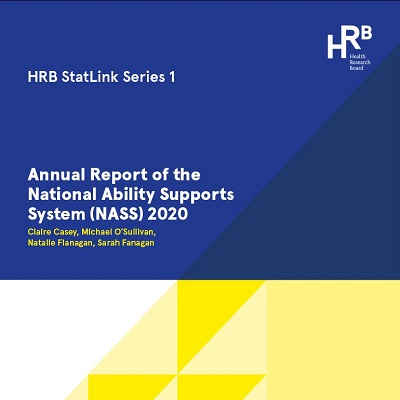HRB publishes latest data on supply of and demand for disability services
A total of 36,649 people use or still need, a disability service in Ireland according to latest figures recorded by the Health Research Board (HRB) on the National Ability Supports System (NASS)
4 min read - 2 Jun 2021

NASS collects demographic and service use information about HSE disability-funded services for people with intellectual, physical and sensory disability, autism and developmental delay. The key findings are outlined in the NASS Annual Report 2020, published today (2 June 2021).
According to Sarah Fanagan, Research Officer at the HRB,
‘By securely monitoring the needs of people who use disability services over time, the Health Research Board can provide solid evidence that can help inform more targeted approaches to service provision that will address people’s needs.
A key development on NASS recently is the inclusion of specific data on the needs of people with autism and development delay. Having this detail will ultimately improve identification and provision of relevant and timely services for these groups.’
Key findings in the NASS Annual Report 2020 show:
Demographic profile
- Three-in-five (21,694) of the people registered on NASS in 2020 were male.
- More than one-in-three (12,571) people registered were under 18 years of age.
- Intellectual disability was the most commonly reported primary disability (22,746, 62%) followed by a neurological disability (4,201, 12%) and autism (3,804, 10%).
- Almost four-in-five (3,013) of those with autism were male.
- Half of those registered on NASS who do not live in a residential setting (16,292) reported having a primary carer, the majority of carers were parents (13,729).
Current services 2020
- One-in-five people (7,535) accessed residential services.
- Approximately three-in-five people (23,194) accessed day services. Some people may attend more than one day service.
- One in 20 people (1,742) accessed overnight respite places.
- One-in six people (6,235) accessed services and supports that enable a person with a disability to live more independently and participate more effectively in the community (recorded as supports for daily living on NASS in 2020).
- Two-in every-three people (24,039) received at least one specialist support in 2020, with speech and language therapy, occupational therapy, and social work the three most common supports provided.
Service demand for 2020-2025
- 1,000 new residential placements are needed and 1,366 people need enhancements to their current service (for example, additional hours/days or additional supports).
- 1,214 new day service places are needed and 3,720 enhancements are required to current day service placements.
- 761 new overnight respite places are needed and 597 enhancements to current overnight respite are required.
- 800 new supports for daily living are needed and 1,095 enhancements to current supports are required.
- 4,886 new places for specialist supports are needed and 19,724 enhancements to current specialist supports are required.
Concluding, Ms Fanagan emphasises the importance of complete and timely reporting of data,
‘This is the second year that the HRB has reported data collected in the NASS system and we are encouraged that the number of people registered on NASS continues to grow. For us to provide the full picture of disability services that people in Ireland need in their everyday lives, we rely heavily on service users and service providers to provide their data to NASS. We look forward to working with the HSE and HSE-funded service providers to maximise the return of data in 2021 to support effective planning that meets the needs of people with disabilities and their families.’
You can read the full Annual Report of the National Ability Supports System (NASS) 2020 on the publications page of the HRB website.
Read supplementary reports on intellectual disability, physical and sensory disability and autism are also available.
Background notes
NASS
NASS was established in 2018 to replace the HRB’s two previous disability information systems: the National Intellectual Disability Database (NIDD) and the National Physical and Sensory Disability Database (NPSDD). NASS has consolidated and expanded upon the previous systems to also include data on autism, development delay and mental health.
Data completeness
Every effort was made to ensure the information available on NASS reflects the full picture of disability services that people use and require in their everyday lives, however some service providers were unable to return data for 2020. In spite of the impact of Covid-19, NASS records rose by over 14,000 compared to 2019, and it is fully expected that the numbers of registrations will grow again in 2021.
4 min read - 2 Jun 2021



